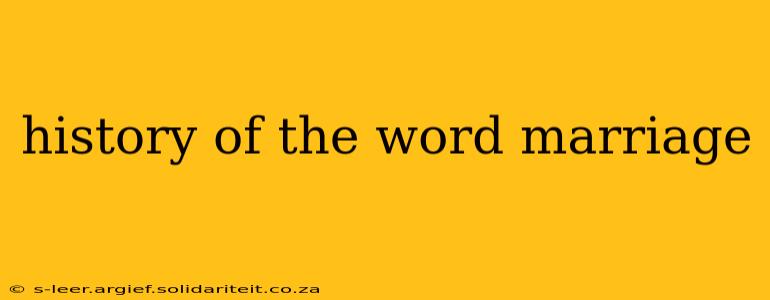The word "marriage," a cornerstone of human society, boasts a rich and multifaceted history. Its evolution reflects changing social norms, cultural influences, and linguistic transformations over millennia. Understanding its etymology provides a fascinating glimpse into the development of human relationships and societal structures.
What is the origin of the word "marriage"?
The word "marriage" traces its roots back to the Old French word "mariage," which itself stems from the Latin "maritagium." This Latin term, however, wasn't simply a word for the institution we understand today. "Maritagium" referred to the act of giving a woman in marriage, highlighting the historical emphasis on women as property within the marital union. This points to a significant aspect of the word's history – the societal and legal implications tied to the transfer of property and rights. The "maritus" part of the word referred to the husband, further reinforcing the patriarchal structures prevalent in ancient societies.
How did the meaning of "marriage" change over time?
The meaning of "marriage" has evolved considerably throughout history. While the initial Latin root emphasized the transfer of a woman's rights and ownership, the modern understanding encompasses a far broader spectrum of meanings. It has shifted from a primarily transactional arrangement to an institution emphasizing love, companionship, and mutual commitment. This shift reflects broader societal changes, including the rise of romantic ideals, legal reforms granting women greater equality, and evolving societal acceptance of diverse forms of partnership. The very concept of marriage has become more fluid and inclusive, expanding to encompass LGBTQ+ relationships in many parts of the world.
What are some related words to marriage?
Many words related to marriage offer further insights into its historical context. Terms like "matrimony," derived from the Latin "matrimonium," emphasize the maternal aspect of marriage, while "wedlock," an older English term, carries connotations of being "locked" or bound in a committed relationship. These variations in vocabulary reflect the multifaceted nature of the institution and its evolving significance across different cultures and historical periods.
What are the different legal aspects of marriage?
The legal aspects of marriage have significantly impacted its evolution and meaning. Throughout history, marriage laws have varied considerably across cultures and societies, defining property rights, inheritance, and the legal status of spouses. In many societies, marriage laws have historically favored men, dictating women's roles and limiting their autonomy. The ongoing evolution of marriage laws reflects a broader movement toward gender equality and recognition of diverse family structures. Today, marriage laws continue to evolve, reflecting changing societal values and legal interpretations.
How has the concept of marriage changed across different cultures?
The concept of marriage has varied significantly across cultures and time periods. While some cultures emphasize arranged marriages and familial ties, others prioritize individual choice and romantic love. Even within a single culture, the concept of marriage can evolve over time, reflecting changing social norms and values. For example, the role of women within marriage, the importance of arranged marriages versus love marriages, and the legal recognition of same-sex marriage have all changed considerably across cultures and over time. Understanding these cultural nuances provides a broader perspective on the multifaceted history of this central human institution.
Conclusion: The Enduring Legacy of "Marriage"
The word "marriage," in its etymology and evolving meaning, provides a powerful window into the shifting social, legal, and cultural landscapes of human history. From its origins highlighting transactional aspects to its modern-day emphasis on love, companionship, and mutual respect, the word's journey reflects the ongoing evolution of human relationships and societal values. Its continued evolution, shaped by legal reforms, cultural changes, and evolving societal perspectives, ensures that the meaning of "marriage" will remain dynamic and relevant for generations to come.
